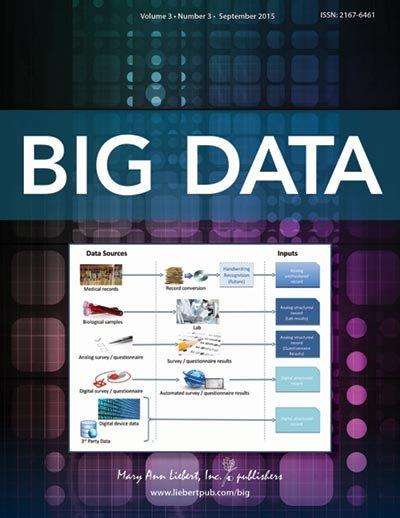Launch of Kavli HUMAN Project—Big Data to provide unprecedented insights on health and behavior

The Kavli HUMAN Project (KHP) will use Big Data approaches to aggregate and analyze a variety of measurements gathered over 20 years on 10,000 individuals in roughly 2,500 households in New York City to determine how human health and behavior co-evolve over the lifecycle. The innovative design and groundbreaking scale of the project enable it to capture the dynamic interplay of biology, behavior, and the environment and how these forces impact health and disease, as described in a series of articles in Big Data.
In "Using Big Data to Understand the Human Condition: The Kavli HUMAN Project", Okan Azmak, Hannah Bayer, Andrew Caplin, Paul Glimcher, Steve Koonin, and Ari Patrinos of New York University (NYU), and Miyoung Chun from the Kavli Foundation, present the goals and methods of the KHP. The interdisciplinary data platformed, to be made available for researchers to do their own exploratory analyses, will include measures collected from study participants of biological, behaviorial, and environmental conditions whose interactions comprise what the authors refer to as the "bio-behavioral complex."
Kenneth Langa, University of Michigan and Veterans Affairs Ann Arbor Health System, and David Cutler, Harvard University, T.H. Chan School of Public Health, describe how the KHP data will provide new insights into the factors that increase risk for cognitive decline from birth through old age. In "Opportunities for New Insights on the Life-Course Risks and Outcomes of Cognitive Decline in the Kavli HUMAN Project", the authors explain that the data will also measure the impact of cognitive decline on performing activities of daily living, on family members and caregivers, and on healthcare utilization and end-of-life decisions.
This issue of Big Data also includes KHP-related articles by Laura Bierut, Washington University in St. Louis, and David Cesarini, NYU, entitled "How Genetic and Other Biological Factors Interact with Smoking Decisions", and Dennis Ausiello, Massachusetts General Hospital, and Scott Lipnick, Harvard Medical School, entitled "Real Time Assessment of Wellness and Disease in Daily Life". Adam Drewnowski, University of Washington, Seattle, and Ichiro Kawachi, Harvard University, coauthored the article "Diets and Health: How Food Decisions are Shaped by Biology, Economics, Geography, and Social Interactions".
"The Kavli HUMAN Project represents the first real synthesis of big data techniques across multiple domains and disciplines to quantify and understand the human condition in a scientifically rigorous manner," says Big Data Editor-in-Chief Vasant Dhar, Professor at the Stern School of Business, New York University. "This endeavor represents a major leap in the field of big data and will allow for truly novel insights into the underlying mechanisms of human health and behavior."
More information: The articles are available for free on the Big Data website.
Provided by Mary Ann Liebert, Inc



















